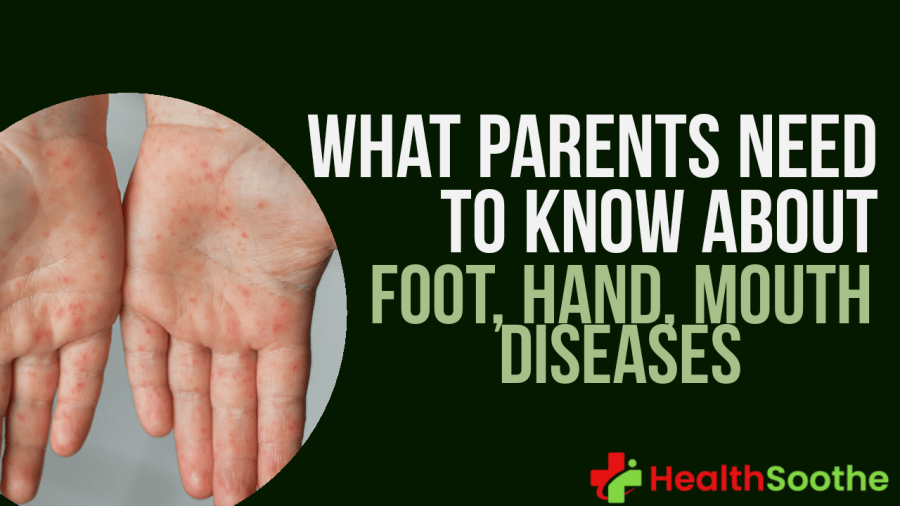Hand, foot, and mouth disease is a highly contagious viral infection that commonly affects young children or infants.
Quick Facts About Hand, Foot and Mouth Disease (HFMD)
The disease is characterized by fever, mouth sores, and a rash on the hands and feet. Although the illness is usually mild and resolves on its own, it can sometimes lead to serious complications.
In this blog post, we will explore everything parents need to know about hand, foot, mouth disease. We will discuss the symptoms, diagnosis, treatment, and potential complications of the illness.
By the end of this post, you will be well-informed about this common childhood infection and how to best manage it if your child should ever develop it.
- What Are The Most Frequent Symptoms Of Hand, Foot, Mouth Diseases?
- What Are The First Symptoms Of HFMD?
- How Does HFMD Usually Progress?
- How Do Doctors Typically Diagnose Hand, Foot, Mouth Diseases?
- Why Is It Important To Get A Proper Diagnosis?
- What Pathogens Causes Hand, Foot, Mouth Diseases?
- Are Certain Children At Higher Risk For Catching HFMD?
- How Contagious Is HFMD?
- How Is Hand, Foot, Mouth Diseases treated
- Are There Ever Any Complications From Hand, Foot, Mouth Diseases?
- Which HFMD Should Parents Be Aware Of?
- Conclusion
What Are The Most Frequent Symptoms Of Hand, Foot, Mouth Diseases?
The most common symptoms of Hand, Foot, Mouth Diseases are fever, sore throat, and rash. The rash typically appears on the hands, feet, and mouth. It is important to note that the rash may not be present at the time of diagnosis. Other symptoms include loss of appetite, fatigue, and body aches.
What Are The First Symptoms Of HFMD?
The first symptoms of hand, foot, mouth disease are usually fever and sore throat. Other early symptoms include reduced appetite, irritability, and small red spots with blisters on the tongue, gums, or inside of the cheeks. The spots eventually turn into open sores. A child with hand, foot, mouth disease may also have a rash on the palms of their hands and soles of their feet. The rash typically consists of small red bumps that may blister or become scaly.
How Does HFMD Usually Progress?
The disease usually progresses over the course of several days, with a fever and sore throat, followed by the development of small blisters appearing on the hands, feet, and/or mouth. The blisters eventually break open and turn into painful ulcers. The fever and sore throat typically resolve after a few days, but the ulcers can take up to two weeks to heal. In some cases, secondary bacterial infections can develop, which may require antibiotic treatment.
How Do Doctors Typically Diagnose Hand, Foot, Mouth Diseases?
There is no one definitive way for doctors to diagnose Hand, Foot, Mouth Disease. The most common method is through a visual examination of the mouth, throat and several other part of the body where the symptoms can be visible. If the telltale signs of the disease are present, such as blisters or ulcers in the mouth, a diagnosis can be made without further testing.
The doctor might also ask whether the child has been in close contact with someone else who has HFMD. In some cases, a doctor may order laboratory tests to confirm the diagnosis. A viral culture or nucleic acid test can be used to identify the presence of the virus that causes Hand, Foot, Mouth Disease. Blood tests may also be ordered to confirm the diagnosis.
Why Is It Important To Get A Proper Diagnosis?
There are a number of reasons why it is important to get a proper diagnosis when it comes to hand, foot, mouth disease. First and foremost, the symptoms of this disease can be very similar to other illnesses, such as the common cold or flu. This can make it difficult to determine whether or not a child has hand, foot, mouth disease without a doctor's help.
Additionally, while most cases of hand, foot, mouth disease are mild and resolve on their own within a week or two, some children may develop more severe complications. These can include dehydration from fever and diarrhea, secondary bacterial infections, or even meningitis. Early diagnosis and treatment of hand, foot, mouth disease can help prevent these more serious problems.
What Pathogens Causes Hand, Foot, Mouth Diseases?
There are a number of different viruses that can cause hand, foot, mouth disease, including the coxsackievirus, enterovirus 71, and the parechovirus. These viruses are all members of the picornaviridae family, which includes a number of other well-known viruses such as polio.
Are Certain Children At Higher Risk For Catching HFMD?
There are certain children who may be at a higher risk of catching hand, foot, mouth disease. These include:
- Children who are not vaccinated against the virus
- Children who have close contact with someone who has the virus
- Children who live in or travel to areas where the virus is common
- Children with weakened immune systems.
Parents need to be aware of these risk factors and take measures to protect their children accordingly.
How Contagious Is HFMD?
Hand, Foot, Mouth Disease is a highly contagious viral infection that typically affects young children. The virus is spread through close contact with an infected person, such as sharing cups or utensils, or coming into contact with respiratory secretions.
How Is Hand, Foot, Mouth Diseases treated
There is no specific treatment for hand, foot, mouth disease and the virus must run its course. However, there are measures you can take to help ease your child’s discomfort and prevent the spread of the virus.
The first and most important thing is to keep your child hydrated. Offer them plenty of fluids to drink, such as water, clear soup, or electrolyte-rich beverages like sports drinks. You can also give them popsicles or ice chips to suck on.
Next, provide your child with pain relief. Over-the-counter medicines like ibuprofen or acetaminophen can help with fever and body aches. For sore throats, you can give your child lozenges or have them suck on hard candy.
Finally, encourage your child to rest and avoid strenuous activity. Hand, foot, mouth disease is contagious and easily spread through coughing and sneezing, so it’s important to keep your child home from school or daycare until they’re feeling better.
Are There Ever Any Complications From Hand, Foot, Mouth Diseases?
There are rare, but serious, complications that can occur from Hand, Foot, Mouth Disease. These include viral meningitis, encephalitis (inflammation of the brain), and myocarditis (inflammation of the heart). While these complications are rare, they can be deadly. If your child develops any of these symptoms, it is important to seek medical help immediately.
Which HFMD Should Parents Be Aware Of?
There are several different types of hand, foot, mouth disease that parents should be aware of. The most common type is coxsackievirus A16, which is a virus that primarily affects young children. It is highly contagious and can cause fever, mouth sores, and a rash on the hands and feet. Other less common types of hand, foot, mouth disease include herpangina and enterovirus 71. Herpangina is caused by a different virus and usually affects older children or adults. It causes fever and painful mouth sores. Enterovirus 71 can cause more serious symptoms such as encephalitis (inflammation of the brain) or meningitis (inflammation of the spinal cord). This virus primarily affects infants and young children.
Conclusion
Hand, foot, and mouth disease is a highly contagious viral illness that can cause fever, sores in the mouth, and a rash on the hands and feet. Although it is most commonly seen in children, it can affect people of all ages. Parents need to be aware of the symptoms of hand, foot, mouth disease so they can seek medical treatment for their child if necessary. With early diagnosis and treatment, hand, foot, mouth disease can be easily controlled and should not cause any long-term problems.

My name is Iyanu Kolawole, I’m a professional content writer and web developer. I have always been passionate about writing and developing my coding skills. I started my career as a content writer and have written for several companies and brands. I am also a skilled web developer and have built several websites for businesses and individuals.I am a hardworking individual who is always looking to improve my skills. I am constantly striving to learn new things and to be the best at what I do. I am also a very friendly person and enjoy working with others.
The content is intended to augment, not replace, information provided by your clinician. It is not intended nor implied to be a substitute for professional medical advice. Reading this information does not create or replace a doctor-patient relationship or consultation. If required, please contact your doctor or other health care provider to assist you to interpret any of this information, or in applying the information to your individual needs.


